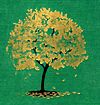
"Raintree County"
by Ross Lockridge Jr.
Viking/Penguin, $18.95, 1050p
Paper ISBN: 014023666X
"Shade of the Raintree"
by Larry Lockridge
Viking/Penguin, $27.95h/$14.95p, 500p
Hardcover ISBN 0-670-85440-9
Paperback ISBN: 0140158715
Since "Raintree County" appeared in 1984, no one has known what to make of Ross Lockridge, Jr.'s massive and provocative novel. Readers made it into an instant best-seller. Hollywood made it into a bad move with Elizabeth Taylor and Montgomery Clift. Literary critics made their judgments, favorable or not, revealing mostly that they did not understand it. At age 33, Lockridge made himself into the celebrity suicide of 1948, and "Raintree County" went out of print.
This week on what would have been the author's 80th birthday, Penguin is releasing "Raintree County". At the same time, Viking is publishing a new biography of Lockridge by his son, Larry, a professor at New York University and a literary critic.
Ross Lockridge's epic work deserves resurrection. This may simply be a better time for "Raintree County." Lockridge's own cover design shows how the twin hills, river and swamp of Raintree County take the form of the book's mystical river goddess. Lockridge brought magical realism to his portrait of 19th-Century Indiana, but in 1948 it was that naked goddess, and the novel's honest sensuality that got all the attention. To this day, Larry Lockridge writes, some Indiana folk think his father "got what he deserved for writing that dirty book."
"Raintree County" is the story of John Wickliff Shawnessy, based on both the author and his great-grandfather. Johnny is a country boy and aspiring writer. He's looking for the secrets of love and life, especially the legendary raintree, which may hold them all. He loves the right girl, marries the wrong girl, loses a child, fights in the Civil War and comes home after he has been presumed dead. Johnny makes his own rebirth and achieves an everyday kind of wisdom. He never writes his great American masterwork, but instead starts a new family and becomes the cherished local schoolmaster.
The novel's literary progenitors are Thomas Wolf, Walt Whitman and James Joyce. "Ulysses" especially must have knocked Lockridge out, its influence is everywhere in "Raintree County." July 4, 1892, for example, becomes Shawnessy's day. As he participates in the day's celebrations, Johnny has cause to remember and reflect on his life. Flashbacks, dream-like and cinematic, tell the story, and the climax to an episode is often delayed--inside Johnny' mind, time is not sequential and reality has no boundaries. No wonder critics of the day could not, or would not, understand the novel.
Johnny, who quests for truth and beauty, represents all that has been right with America. His opposites are a pair of genuine American scene-stealers, Johnny's teacher, Prof. Jerusalem W. Stiles, atheist, skeptic and rabble-rouser, and his rival, Garwood B. Jones, slick-talking, sleazy and ambitious. The professor winds up in tabloid journalism, and Garwood B. Jones ends up in the U.S. Senate -- poor Lockridge could see all too well what was happening to his beloved country. (Also ahead of time, and unappreciated, was his fear for the natural environment of Raintree County, his sense that America was under attack from railroad tracks and smokestacks.)
Larry Lockridge says his father hoped the novel would remind people of the original promise of America, "still alive though stunted." Is that a clue to his suicide? Perhaps. It's one of the possibilities considered by Larry, who was 5 when his father died and who "grew up with a novel instead of a father."
In his research, Larry also found that his father was anguished over publication of the novel. "To finish a work of art is to lose it and when an artist has loved the work over so many years it may feel like grief to give it up," Larry writes. It didn't help that depression ran in Lockridge's family, that he was fighting with his publisher, and that all the medical establishment had to offer was electroshock therapy, which he tried -- once. Again, Larry finds, Lockridge was ahead of his time. He needed therapy and medication that didn't yet exist.
Larry Lockridge does a remarkable job of examining his father's life, death and work. There is nothing family-serving about his biography, no attempt to hide the demons that Ross Lockridge, Jr. was fighting. Best of all, Larry Lockridge provides a literary analysis that will help readers find the magic in his father's book.
--Marcia Abramson is a Free Press copy editor who remembers her mom having "Raintree County" on her coffee table.
Originally Published in Detroit Free Press, April 27,1994Article Posted by permission of the Author © 1994 Marcia Abramson

| The Novel | Essays | Other Writings | RL Jr. Writer's Award | Complete Contents | Book Orders |
| The Biography | Photos / Postcards | RC Source & Facsimiles | Suicide & Prevention | Movie & Score |